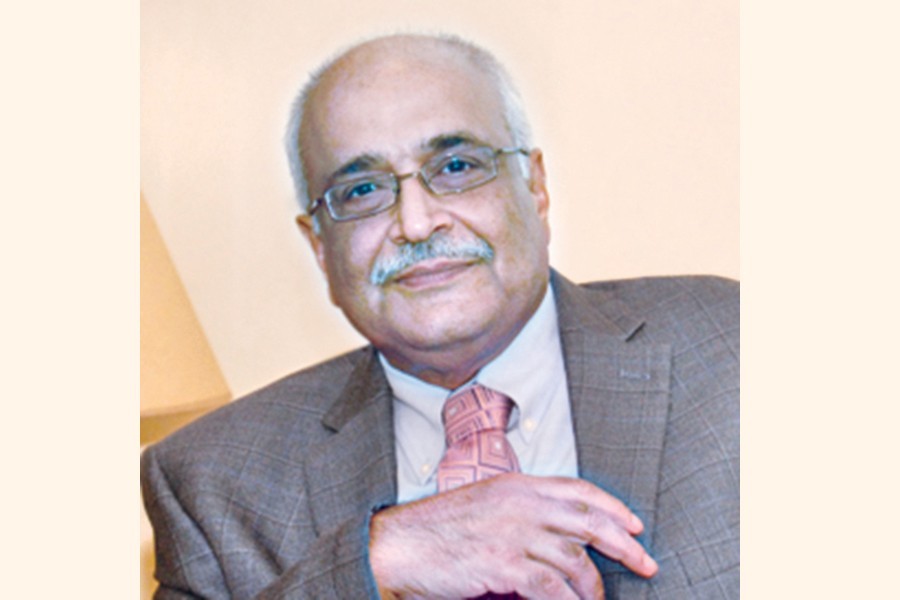Dhaka, Delhi need much stronger framework for future economic ties, says Debapriya

Published :
Updated :

Distinguished Fellow at the Centre for Policy Dialogue (CPD) Dr Debapriya Bhattacharya has said Bangladesh and India need a “much more robust framework” for their future economic relationship and a change in the framework is important to make that happen.
The macroeconomist and public policy analyst said the Comprehensive Economic Partnership Agreement (CEPA), now on the table, needs to be coherent, dynamic and inclusive to address the challenges ahead and help boost trade and investment between the two countries, reports UNB
“CEPA has to be coherent, dynamic and inclusive. CEPA is the name of the game,” said Debapriya highlighting Bangladesh-India relations on three fronts -- leftover, built-in and emerging issues.
The former Ambassador and Permanent Representative of Bangladesh to the World Trade Organization (WTO) made the remarks while delivering his speech at a symposium titled ‘Bangladesh-India Relations: Prognosis for the Future’ held recently.
Indian High Commissioner to Bangladesh Vikram Kumar Doraiswami delivered the keynote speech at the symposium. Renowned scholar-diplomat and adviser on foreign affairs to the last caretaker government Dr Iftekhar Ahmed Chowdhury chaired the event hosted by the Cosmos Foundation, philanthropic arm of the Cosmos Group.
Chairman of the Cosmos Foundation Enayetullah Khan delivered the opening remarks at the event.
An array of experts from Bangladesh and India -- former Ambassador Tariq A. Karim, Director, Institute of South Asian Studies, National University of Singapore Prof C. Raja Mohan, Dhaka University Prof Imtiaz Ahmed, former Indian High Commissioner to Bangladesh Pinak Ranjan Chakravarty, Bangladesh Institute of Peace and Security Studies (BIPSS) President Maj Gen (retd) A. N. M. Muniruzzaman, CPD Executive Director Dr Fahmida Khatun, Brig. Gen. (retd) Shahedul Anam Khan and former Indian Foreign Secretary Krishnan Srinivasan -- were brought together for the online symposium to assess the state of relations between the two countries and identify the challenges and opportunities that lie ahead in the effort to take it forward.
The noted economists said the leftover issues are very well known to all -- water, border security issues and others which will have to deal with successfully.
He said the built-in issues are essentially the trade, investment, connectivity and all other issues. “We can’t escape from these issues.”
Debapriya said the third set of issues is the emerging issues that include IT, financial inclusions and many other issues.
The renowned economist said they need a framework within which all these three types of issues can be addressed. “We need a framework which will also address the current emphasis of our cooperation on the economic front.”
He said Bangladesh and India have achieved quite a lot in the recent past, especially over the last 10 years, with a move from trade focus to more on connectivity one.
“What’s important to make the next step?” he said, highlighting the importance of investment focus -- the production value chain issue.
Debapriya said Bangladesh cannot solve its leftover issues without improving the space for negotiation.
Highlighting Bangladesh’s economic growth, Debapriya said Bangladesh deserves a “less than full reciprocity” in the relationship as it goes.
He said dealing with the external issue, one of the understated dimensions of Indo-Bangla relationship, is how Bangladesh is cooperating with India or how India is cooperating with Bangladesh at the global stage.
Debapriya said India has to be a part of the smooth transition of LDC graduation of Bangladesh, and said India has provided duty- and quota-free market access which helped Bangladesh’s exports to India cross US$ 1.2 billion-dollar mark.
“I think India has to continue with the duty- and quota-free market access in line with other markets providers like the European, Canada and Australia,” the economist said.
He added that this is a declaration that will continue to support Bangladesh with duty- and quota-free market access for the export of garments at least in three years, not nine years, in line with WTO proposals. It will be a great service and it will continue greatly to strengthen the relationship.
CPD Executive Director Dr Fahmida Khatun said the relationship between Bangladesh and India is covering a wide range of aspects, including trade, investment, power and energy; communication, health, education and culture.
She said the collaboration between the two countries perceives an important factor, not only for the two countries but also for enhancing South Asian cooperation.
Fahmida said they need to understand the challenges and identify the opportunities through concrete actions by both the countries.
The economist laid emphasis on the issue of harnessing advantage of closer bilateral cooperation and leveraging this cooperation to ensure strengthening regional and global integration of the economy.
The CPD economist said Bangladesh needs reimaging its own policies, strategies and options during this journey.
As a large neighbour, she said, India can feature prominently through extending support and cooperation in a number of areas and noted that in the last decade, there were a number of initiatives towards depending bilateral cooperation in different areas, including trade and goods, services, energy, and multimodal transport connectivity, cross-border trade, capacity building, deepening people-to-people connectivity, and also security measures.
“For Bangladesh, there’re many trade-related challenges. One of the important challenges is to make greater use of Indian offer of duty- and quota-free market access. It’s still underutilised,” Fahmida said, adding that there is a huge trade gap, too.
Statistics showed that trade and economic cooperation between India and Bangladesh is much lower than its full potential, she added.
According to the World Bank Study, Bangladesh and India trade economic potential is almost $16 billion, but the actual trade is around $10 billion.
Fahmida said the cost of trading is very high due to lack of trade facilitation and logistic shortcoming.
She said the future relationship between Bangladesh and India will depend on how the challenges are addressed by both the counties.


 For all latest news, follow The Financial Express Google News channel.
For all latest news, follow The Financial Express Google News channel.